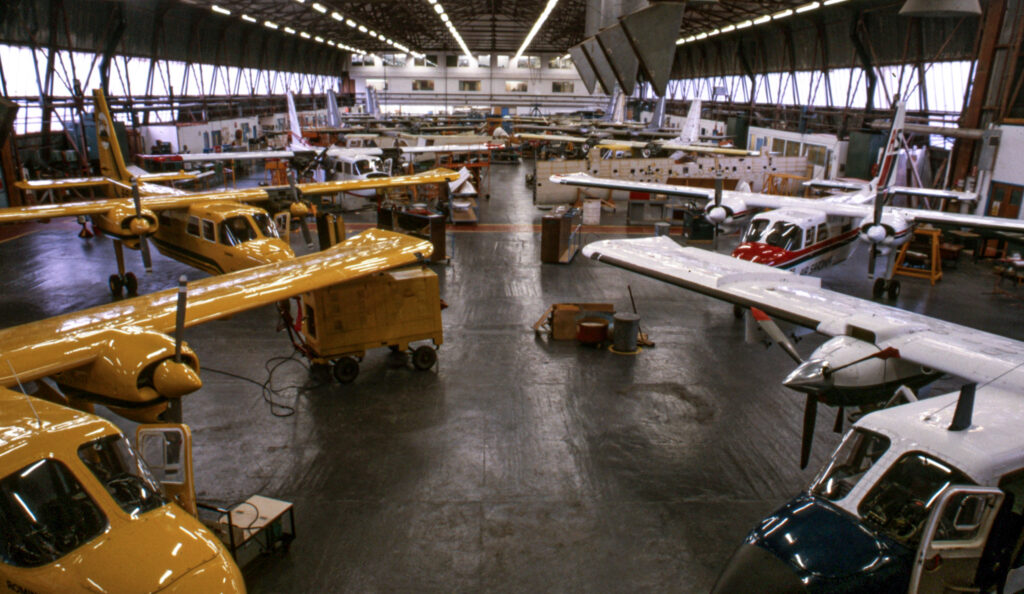 Piloted by John Britten and Desmond Norman, the Islander prototype flew for the first time on 13 June 1965. The 10-passenger short takeoff and landing (STOL) piston twin looked entirely unremarkable as it departed Bembridge Airport on the UK’s Isle of Wight.
Piloted by John Britten and Desmond Norman, the Islander prototype flew for the first time on 13 June 1965. The 10-passenger short takeoff and landing (STOL) piston twin looked entirely unremarkable as it departed Bembridge Airport on the UK’s Isle of Wight.
Britten-Norman (BN) began manufacturing the Islander in facilities adjacent to the airfield and it became a best seller. Turboprop, military Defender, and three-engined Trislander variants followed. But orders soon overwhelmed BN’s production capability, and by 1970, the bulk of manufacturing had moved overseas, to Romania and Belgium, as BN changed ownership.
The overall Islander design appeared to remain unchanged throughout, but in fact evolved with emerging technology. It now returns home to be manufactured in the UK at Bembridge, with a new production line opened on 21 September 2023.
Lara Harrison, BN’s business development director, is excited by the move. “Bembridge is our ancestral home and it’s momentous for Britten-Norman that Islander production has been repatriated here. Now we have the opportunity to enhance our production capabilities, improve supply chain efficiency, and accelerate outputs. Simply put, we can scale the business at a significantly faster rate than would have been otherwise possible.
“New aircraft production is forecast to increase fourfold by 2027 to eight new aircraft per year and we expect to create numerous job opportunities and contribute to the economic growth of the Isle of Wight and wider Solent area.”
Acknowledging that the Islander’s appearance might give the impression that little has changed during the manufacture of more than 1,300 aircraft, Harrison reveals: “Over 2,000 modifications have ensured the Islander continues to deliver unrivalled performance, meets individual customer needs and adopts the latest technology.”
The standard production avionics fit, for example, includes the Garmin G600 series and GTN glass cockpit, including Bluetooth connectivity, with a variety of further Garmin options on offer, weather radar and a radar altimeter among them.
“We are a Garmin approved dealer,” Harrison notes, “offering avionic upgrades to the pre-owned/retrofit market as well. Beyond upgrades and modifications, our customer service team also provides advice, AOG responses, spares, repairs, technical support, field service engineering, and training.”

An Islander, used for instruction at Bembridge, demonstrates the type’s simple, classic lines. Image: Britten-Norman
While the Islander continues to satisfy its niche with airline customers, it is also poised to take a leading role in introducing new propulsion systems.
“A strategic partnering agreement between Britten-Norman and Cranfield Aerospace Solutions on Project Fresson will deliver a flying demonstrator showcasing hydrogen propulsion technology with a clear route to market. Part funded by the Aerospace Technology Institute, the project is focused on developing the technologies that will deliver the world’s first truly green passenger-carrying airline services,” explains Harrison.
She continues, “We are committed to a shared vision of sustainable aviation and working in lockstep to deliver Project Fresson, with aircraft certification planned by the end of 2026. Project Fresson’s hydrogen-modified propulsion system is intended to be applicable to retrofit and for new build aircraft.”
Meanwhile, Harrison describes BN’s Green Futures scheme as an important pillar in its future, as it seeks active participation in decarbonising the aviation industry. The continued importance of the piston- and turbine-engined Islander models in the near term is not being forgotten, however. “They remain an important part of our plans. We’ll continue to invest in these variants and in due course we’ll be making announcements on enhancements to the aircraft’s interior and exterior,” she says.
Returning to the medium term and the potential for a net zero emissions Islander, Harrison says the airframe is easily adapted for hydrogen power by retrofit, while new build ‘hydrogen’ aircraft will be optimized for improved performance.
“We are in a unique position to deliver the next generation of zero-carbon aircraft,” she concludes.
Related Articles:
- New England Airlines brings the AvGeek fun on Britten-Norman Islander
- Airbus works with ZeroAvia to help make hydrogen flights take off
- Regional flights powered by hydrogen edge closer to launch
- Deutsche Aircraft on the real-world sustainability of its D328eco
- Activity ramps up to advance e-fuels and hydrogen in aviation
- Embraer targets hybrid- and hydrogen-electric concepts under Energia
- Airbus details hydrogen plans as EDF warns about possible leaks
Featured image credited Cranfield Aerospace Solutions/Britten-Norman















